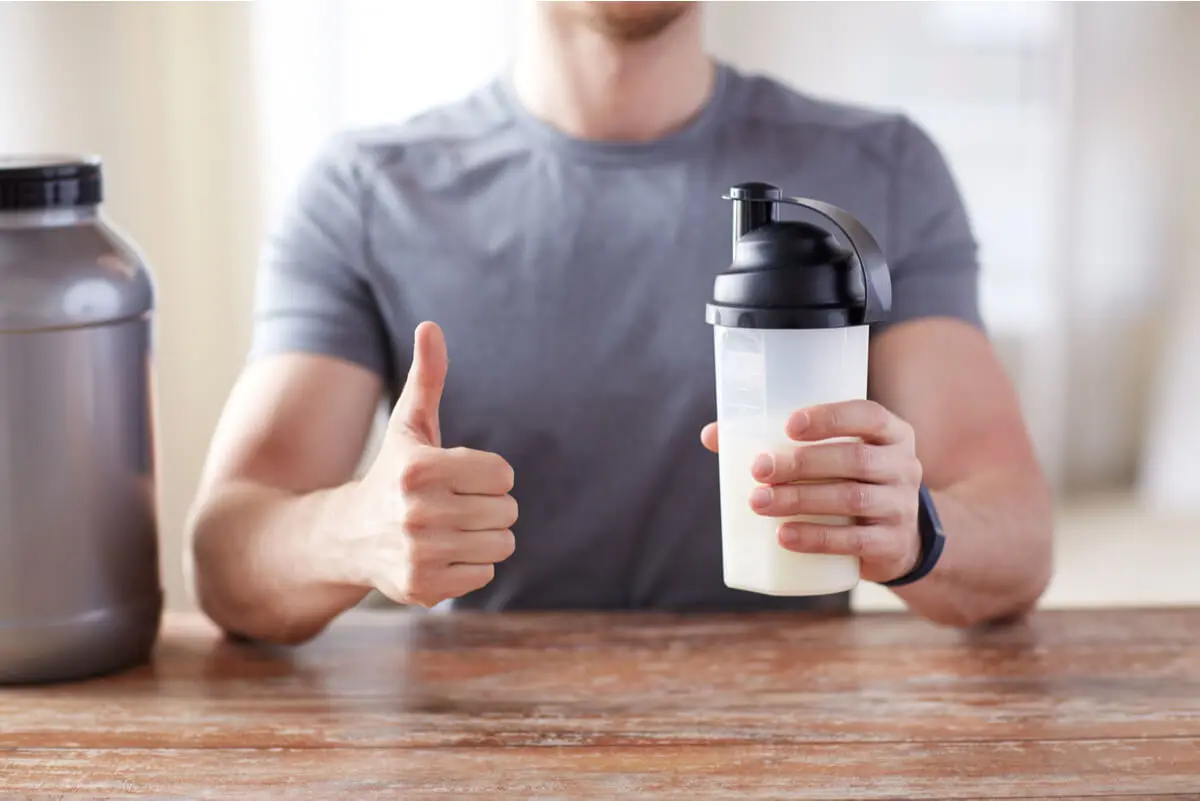What Type of Diet Do I Need if I Want to Gain Muscle Mass?


Written and verified by the nutritionist Saúl Sánchez Arias
In order to gain muscle mass, it’s essential to optimize your diet. It’s essential to ensure an energy and nutrient intake that will activate the anabolic metabolic pathways and thus consolidate the gain of lean mass. Otherwise, all your physical effort won’t give you the results you desire.
First of all, it should be noted that, in order to really gain muscle mass, training must be consistent. It’s advisable to work in strength ranges with high loads or medium loads stretching your muscles to their limits. The mesocycles must be well planned throughout the season, offering different stimuli to prevent the tissue from getting used to them.
Calories in the diet to gain muscle mass
The first thing to modify in the diet to gain muscle mass is the energy intake. If there’s no surplus, you won’t be able to build tissue.
This doesn’t mean overdoing it, otherwise you could accumulate a significant amount of fat at the subcutaneous level. This should be avoided, as it could affect internal inflammatory conditions.
It’s sufficient to ensure an excess of between 250 and 500 calories per day in order to stimulate hypertrophy. Beginner athletes should be at the higher end of this range, as they’ll make greater gains early on.
For more advanced athletes, it may be best to aim for a very slight surplus, maintaining the muscle gain program for a longer period of time.

Learn more: 7 Protein Snacks to Increase Muscle Mass
Protein load in the diet
Another key point in the diet to gain muscle mass is the protein intake. Proteins are the most important nutrients in terms of tissue building and repair function.
For this reason, it’s important to ensure that the requirements are met. According to a study published in the Journal of the International Society of Sports Nutrition, athletes should achieve a daily intake of between 1.4 and 2 grams of protein per kilogram of body weight per day. This will generate adaptations in an efficient way.
But not just any type of protein will do. At least half of it must be of high biological value, i.e. of animal origin.
This type of nutrient has all the essential amino acids and a good digestibility score. The intake of leucine is especially important, being one of the amino acids most involved in anabolic processes. This is confirmed by research published in the journal Nature.
However, protein quality is important when the total intake is at the lower end of the range. As you increase the value, you are less likely to experience a deficit resulting from problems in digestibility or lack thereof in nutrients.
You may also be interested in: Build Muscle Mass and Burn Fat with These Quick Tips
Fatty acids and supplements to gain muscle mass
Finally, we must talk about the importance of fatty acids and supplements when it comes to gaining muscle mass. It’s crucial to consolidate an intake of at least 1 gram of fat per kilogram of weight per day.
It will also make a difference to achieve a balance between the consumption of omega 3 and omega 6 fatty acids. This isn’t always easy to achieve. This will require the inclusion of oily fish in the diet.
Another important fact is that it’s very difficult to consolidate hypertrophy without carbohydrates in the diet. These elements are currently demonized, but glucose is one of the main activators of the mTOR pathway, one of the main anabolic mechanisms in the body. Therefore, these nutrients should be consumed on a daily basis, although the complex type should always be prioritized.
In terms of supplements, the benefits of creatine are worth noting. It’s an ergogenic aid that increases maximum strength and power values, positively affecting the performance of athletes. This is confirmed by a study published in the Journal of the International Society of Sports Nutrition. When training with higher intensity, the subsequent adaptations will be more noticeable.

Optimize your diet to gain muscle mass
To gain muscle mass you have to make a series of dietary changes. Executing them without regular physical exercise may not be positive for your health.
For example, in sedentary people, a high carbohydrate intake isn’t recommended. Thus, the first thing to do is to consolidate a good training plan.
Finally, special emphasis should be placed on other important habits that can determine the gain of muscle mass. Among all of them, getting enough sleep every night makes a real difference. At least 8 hours of good quality sleep is necessary to achieve balance in the internal environment and ensure that the recovery processes are carried out.
All cited sources were thoroughly reviewed by our team to ensure their quality, reliability, currency, and validity. The bibliography of this article was considered reliable and of academic or scientific accuracy.
- Jäger, R., Kerksick, C. M., Campbell, B. I., Cribb, P. J., Wells, S. D., Skwiat, T. M., Purpura, M., Ziegenfuss, T. N., Ferrando, A. A., Arent, S. M., Smith-Ryan, A. E., Stout, J. R., Arciero, P. J., Ormsbee, M. J., Taylor, L. W., Wilborn, C. D., Kalman, D. S., Kreider, R. B., Willoughby, D. S., Hoffman, J. R., … Antonio, J. (2017). International Society of Sports Nutrition Position Stand: protein and exercise. Journal of the International Society of Sports Nutrition, 14, 20. https://doi.org/10.1186/s12970-017-0177-8
- Chen, J., Ou, Y., Luo, R., Wang, J., Wang, D., Guan, J., Li, Y., Xia, P., Chen, P. R., & Liu, Y. (2021). SAR1B senses leucine levels to regulate mTORC1 signalling. Nature, 596(7871), 281–284. https://doi.org/10.1038/s41586-021-03768-w
- Kreider, R. B., Kalman, D. S., Antonio, J., Ziegenfuss, T. N., Wildman, R., Collins, R., Candow, D. G., Kleiner, S. M., Almada, A. L., & Lopez, H. L. (2017). International Society of Sports Nutrition position stand: safety and efficacy of creatine supplementation in exercise, sport, and medicine. Journal of the International Society of Sports Nutrition, 14, 18. https://doi.org/10.1186/s12970-017-0173-z
This text is provided for informational purposes only and does not replace consultation with a professional. If in doubt, consult your specialist.








